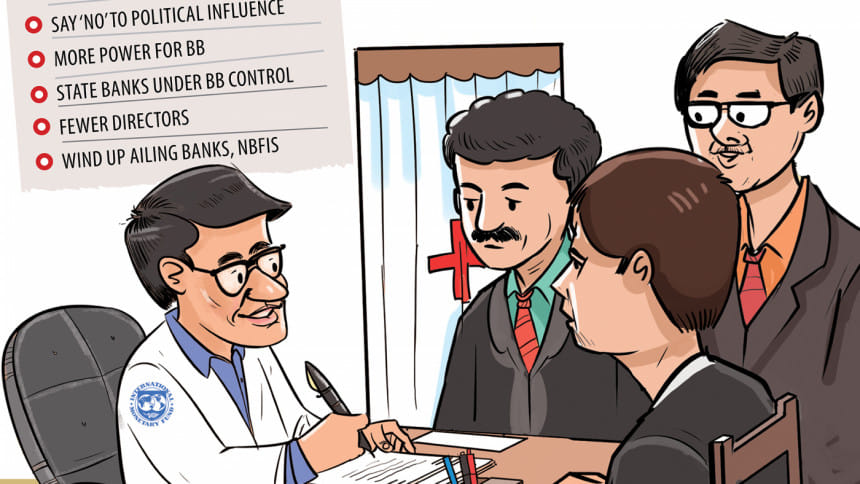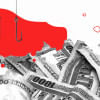Banking in dire straits: Will needed to fix ills

People do not lack strength; they lack will, the French poet and novelist Victor Hugo once said. The words perfectly describe the government’s attitude thus far towards fixing the banking sector.
With defaulted loans mounting and liquidity drying up, the maladies of the banking sector, the heart of the economy, can derail Bangladesh’s campaign to become an upper middle-income country by 2030.
If the Asian financial crisis of 1997 and the global financial crisis of 2007-08 are any indication, it is often elevated financial sector vulnerabilities that bring stories of extended economic success to a crashing halt.
This dawned on the government too, which is why it invited the International Monetary Fund earlier this year to conduct a diagnostic review on the sector.
A specialised mission of the IMF’s Monetary and Capital Markets department twice visited Bangladesh in the last six months for the prognosis and wrote up a prescription with 43 reforms.
But, does the current Awami League government, which is now in its third term, have the will to act on the recommendations?
The mission’s paramount recommendation is greater autonomy and accountability for the Bangladesh Bank -- and this is not the first time that the IMF has called for it.
Back in 2011, this was tagged as one of the conditions for the $1 billion Extended Credit Facility that Bangladesh took from the Washington-based multilateral lender.
Then too, the Awami League-led government huffed and puffed and eventually stopped short of doing what the IMF prescribed.
But giving full operational independence to the BB is the need of the hour.
The best part of the banking sector’s current woes stem from the state banks and they are outside of the full scope of the BB supervision despite the commitment in the Seventh Five Year Plan to bring them fully under the central bank’s oversight.
The eight state banks account for more than half the total defaulted loans of Tk 112,425 crore as of June -- and the BB is precluded from removing chairs and directors in them for the irregularities that led to such mind-boggling volumes of stressed loans.
The financial institutions division of the finance ministry, which also oversees the BB, is the functional owner of state banks and is responsible for both the appointment of directors in them and the oversight of their functions.
Does the government have the resolve to enhance the power of central bank and curtail that of the financial institutions division, this time?
Besides, the division tends to populate the state banks’ board with civil servants, retired civil servants and those banks’ previous management, who while professionally qualified are restricted in their exercise of independent judgement.
Does the government have the intent to appoint fit-and-proper persons to steer the state banks?
If the cases of Pubali Bank, BASIC Bank and Farmers Bank are viewed, having the right people at the bank’s board is the difference between a flourishing and a flagging bank.
Once a model for state-owned banks, BASIC Bank’s fortunes nosedived as soon as its board was taken over by political appointees.
On the other hand, Pubali Bank was the archetypal problem bank until people with the right intentions took charge. Today, it is one of the best run banks in the country.
A more recent case is Farmers Bank, which was set up just six years ago. The bank became a hotbed for financial irregularities in less than three years of operation thanks to its then chairman and audit committee chairman.
Another recommendation of the IMF mission -- which isn’t new either -- is bringing down the maximum number of directors in a bank and increasing the number of independent directors.
The current maximum number of 20 bank directors is too large for effective governance and the current requirement for a minimum of three independent directors out of 20 is inadequate to ensure effective independent oversight, the IMF mission said.
The last time the IMF made such recommendation, the government actually went ahead and did the opposite, essentially.
In the Banking Companies (Amendment) Act 2017, the tenure of a private bank’s board of directors was increased to nine years from six and the quota for board seats for a family was increased from two to four.
The move tightened a single family’s hold on a private bank.
Would better sense prevail this time?
The Washington-based multilateral lender also called for winding up insolvent banks and non-bank financial institutions to prevent further losses, which will ultimately be borne by depositors and other creditors.
The move would not only send out a strong signal to banks but also reinforce public confidence in the banking sector.
Does the government have the stomach for such bold, assertive steps?
At the same time, there needs to be an embargo on giving out new licences for banks and NBFIs.
Since the Awami League came to power 12 new banks came into being. Three more are in the pipeline, which would take the total to a staggering 63.
Experts and stakeholders warned against having that many banks, but the government ignored the good counsel and went about giving permission to new banks, one after the other, mostly on political consideration.
But, the recent entrants have not been effective competitors, struggling to attract funding and pursuing higher risk investment.
Can the government finally exercise restraint?
The IMF mission also called for requirements for loan classification to be aligned with the Basel III standards.
The Basel III standards is an international regulatory accord that introduced a set of reforms in the aftermath of the global financial crisis of 2007-08 for enhanced regulation, supervision and risk management within the banking sector.
Bangladesh started adopting Basel III standards from January 1, 2015 and was due to fully implement them this year.
As per the Basel standards, all loans should be treated as defaults if the borrowers fail to pay instalments for at least 90 days, or there is subjective evidence to indicate that a loss may be incurred.
But, earlier this year, the central bank relaxed the rules for loan classification to give borrowers more time to pay off their instalments, going against the Basel III standards.
The stricter loan classification policy need to be supplemented with stronger enforcement mechanisms for debt repayment and a firmer bankruptcy law. But what is transpiring is the exact opposite of what the doctor prescribed.
For instance, the central bank last month was compelled to reschedule the restructured loans of 11 business groups, which it swore not to four years ago.
The BB had originally planned to allow banks to pursue these defaulters under the Bankruptcy Act of 1997. Instead, it was arm-twisted to give them another chance.
The government and the central bank’s leniency towards defaulters is not only restricted towards these 11 business groups.
At a time when loan defaults were hitting new highs, instead of cracking down on the delinquent borrowers the central bank rolled out a set of extraordinary facilities for them, setting a terrible precedent.
As per the new policy, defaulters would be allowed to reschedule their classified loans by providing slight down payment. They would get more time to pay back their loans and at a lesser interest rate.
Last but not the least, the IMF called for a separation of politics from the decision-making for the sector.
“There seems to be a capture of financial sector decisions by powerful borrowers in Bangladesh,” it said.
Could the government develop the gumption say no to such interference?
To sum up, sound advices were always aplenty but the government lacked the will to execute them. Whether this time would be different -- is what remains to be seen.
But as the oft-quoted saying goes: when there is a will, there is a way.

 For all latest news, follow The Daily Star's Google News channel.
For all latest news, follow The Daily Star's Google News channel. 








Comments